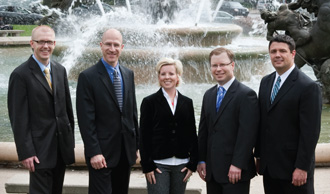Corporate Report 100 at 25: Witness to Realignment
The first 24 years of Corporate Report 100, really, were the easy ones. For most of the past quarter-century, times in this country have been good. Sustained economic growth, in record stretches, seemed the norm. Downturns were, if not pain-free, at least bearable—and short. Identifying the 100 fastest-growing companies was an exercise in the promise of capitalism.
Then came the recession, starting in 2008. Its effects on this listing of the Kansas City region’s fastest-growing companies began asserting themselves with the 2009 field. We at Ingram’s suspected then that revenue numbers would head further south for the 2010 competition. Sadly, we were correct. Our task for the 25th Corporate Report 100 has indeed been more sobering.
But we also knew that Kansas City’s reputation as a center for entrepreneurial zeal would flex its might, introducing some new players to this field of 100. Happily, we were correct. This Silver Anniversary CR100 field is evidence of that particular regional strength.
As you marvel at some of the growth numbers on the following pages, it’s worth noting the larger forces at work on business revenues here. The metrics involved tell the story: In 2007, No. 100 on the list saw revenue growth of 78.42 percent over a four-year period. In 2008, that dipped marginally, to 74.45 percent. It took a more serious step down last year, as No. 100 reported a growth rate of 56.53 percent. And this year, the figure has plunged to 20.60 percent. All About Travel, a local agency tied for the sixth-most appearances on the listing, reported that number, putting it among the top 100 for a 12th time.
Historically, as companies appear on the list, the gravity of triple-digit growth, and at times, growth in four digits, takes hold with a self-regulating moderation. The years pass; companies come, companies go. At times, some are gone before they’ve been able to make much noise on the list—nearly half the 1,031 companies honored since 1986 failed to make the list a second time.
So here’s a toast to this year’s Top 100—the 19 companies crashing the party for the first time, the veterans of recent years and the long-term players who have rejoined this elite lineup after short absences. Despite the challenges we’ve seen in recent years, they continue to get it done. By doing so, they stand as inspiration to all who seek victory on the playing fields of commerce and industry. We salute each of these honorees, and wish each continued success.

(L to R) Chris Isaacson, SVP-COO; CEO Joe Ratterman; Tami Schademann, SVP-chief regulatory officer; Ken Conklin, SVP-business development/marketing; Craig Perrigo, chief financial officer.NUMBER ONE:
BATS GLOBAL MARKETS
1st Year
Gross Revenue:
2009: $917,556,560
2006: $22,372,693
Growth: 4001.23%
Full-time employees: 97
Since its inception in 2005, BATS Global Markets has taken the securities-trading industry by storm, and already stands as the world’s third-largest securities exchange operator. Those button-down Wall Streeters at the New York Stock Exchange and NASDAQ should consider themselves on notice.
The company, based in Lenexa, Kan., truly changed the playing field in securities trading when it launched. It provided a badly needed infusion of competition to existing exchanges, and industry analysts say that prompted other market centers to upgrade technology and reduce prices. The result, according to the Investment Technology Group’s Global Trading Cost Review, “is that U.S. investors benefit from more choice, better technology and overall trading costs that are among the lowest in the world.”
“We are making markets better by focusing on what we know and do best,” said Joe Ratterman, chief executive officer. “BATS has established itself as a significant and credible market center for U.S. cash equities in a very short period of time. While we have earned sizeable market share already, we aren’t letting up anytime soon.” True to Ratterman’s vow, the exchange is expanding overseas. BATS Europe launched in 2008, about the same time the company became a full-fledged U.S. securities exchange. BATS now handles as much as $40 billion in daily notional value of equities traded, besting the totals boasted by such longstanding equities players as the London and Tokyo stock exchanges.

